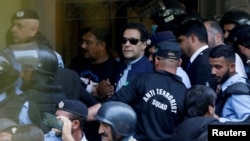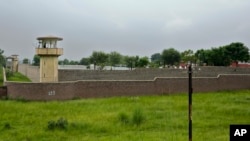A special court in Pakistan extended former prime minister Imran Khan's jail custody for two weeks Wednesday in connection with a lawsuit accusing him of leaking a classified diplomatic communication with the United States to the public.
Khan, who rejects any wrongdoing, is being tried behind closed doors inside the high-security Attock prison, west of Islamabad, where he has been imprisoned since August 5 after being convicted on corruption charges and sentenced to three years.
The current trial centers around a cipher, or a diplomatic cable, from Washington which Khan says proves that the U.S. had colluded with Pakistan's powerful military to oust him from office last year through a parliamentary no-confidence motion.
The 70-year-old former leader faces charges he breached the country's Official Secrets Act for political gains by making the cipher content public. Khan and his opposition Pakistan Tehreek-e-Insaf party have consistently declared that "the cipher is a reality." They say its contents were declassified by his cabinet last year and the U.S. ambassador was summoned to receive a formal protest over the alleged meddling in the country's politics.
While the U.S. has denied meddling, the State Department spokesman, when asked for his reaction to the cipher-related case against Khan last week, said, "We are continuing to monitor this case and monitor the situation closely."
Last month, an American news outlet, The Intercept, published for the first time what it said was the cipher's text. The purported diplomatic communication from Islamabad's then-ambassador to Washington quoted a U.S. official as encouraging him to tell his military leadership that if Khan were not removed from office via a vote of no-confidence over his neutrality on the Russian invasion of Ukraine, Pakistan would face economic and political isolation.
The State Department, while commenting on the reported cipher content, said on August 9 that Washington had objected to Khan's visit to Russia but it played no role in his removal from power.
"So without stipulating whether it's an accurate comment or not, if you take all of the comments in context that were reported in that – in that purported cable, I think what they show is the United States government expressing concern about the policy choices that the prime minister was taking," said spokesman Mathew Miller. "It is not in any way the United States government expressing a preference on who the leadership of Pakistan ought to be," he added.
Khan's attorneys have denounced the Pakistani government for conducting the court hearing inside the jail in violation of his constitutional right to a fair trial, claiming it proves his assertions that the U.S. plotted his removal and that Pakistani authorities want to keep the truth from the public by not holding an open trial.
According to public polls, the jailed cricket star-turned-politician remains the most popular political figure in the country, and his PTI party is rated as the largest political force in Pakistan.
Meanwhile, Khan's party has harshly criticized the U.S. ambassador to Islamabad, Donald Blome, for his recent meetings with senior Pakistani officials, including the controversial chief election commissioner, Sikander Sultan Raja, saying they contradict Washington's stated assertions that it does not take sides in Pakistani politics.
A U.S. Embassy readout after the August 24 meeting of the ambassador with Raja said that Blome reaffirmed Washington's support for "free and fair elections" conducted under the country's law and constitution. "The ambassador reiterated that choosing Pakistan's future leaders is for the Pakistani people to decide," the statement noted.
Raoof Hasan, the information secretary of Khan's party, objected to the U.S. ambassador's engagements, citing a recent Supreme Court judgment that held Raja and other officials "guilty of contempt of constitution by refusing to hold elections" in the country within the stipulated time. He described Blome as the new "viceroy," a reference to the British colonial rulers of the region.
"Consequently, the American viceroy in Pakistan calling on a person who has violated the constitution, I think, is a travesty of the principles they follow in their own country. I think they should be sensitive to the public sentiment here," Hasan told VOA.
He also criticized Blome for meeting with the police chief of central Punjab province, accusing the officer of unleashing a crackdown on PTI workers and detaining hundreds of them, including women.
State Department spokesman Millar was asked on Monday to explain what the U.S. diplomat has to do with meeting the Pakistani chief election commissioner.
"I will refer you to the embassy for specific comment on that meeting, which I'm sure they would be happy to provide. … I will reiterate that the United States does not take any position with respect to the outcome of an election in Pakistan. We do not support any one political party or any candidate in Pakistan. But we, of course, urge free and fair elections in Pakistan, as we do throughout the world."
On Wednesday, British High Commissioner Jane Marriot also visited the election commissioner in his office in Islamabad, infuriating the opposition PTI.





